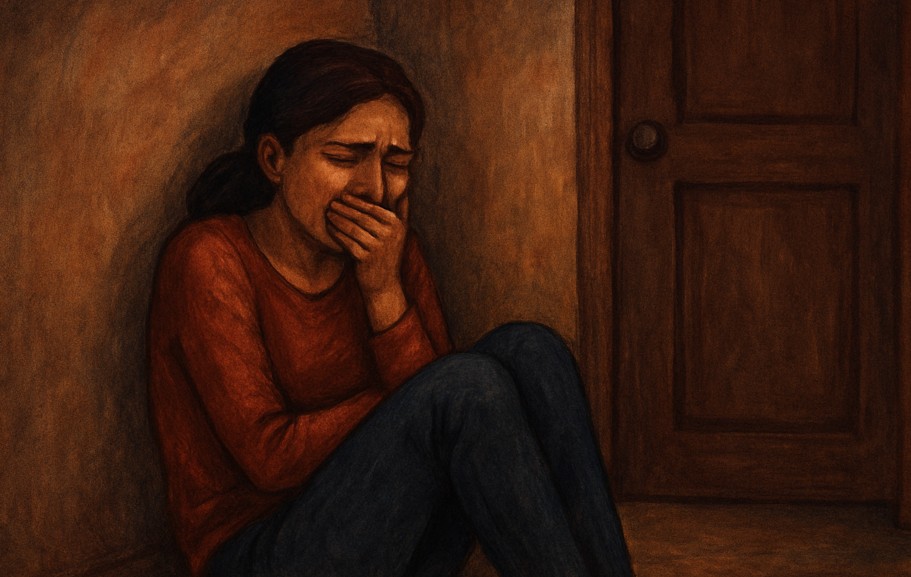Grace is known in her community as Mama Chips, the woman who sells fried potatoes by the roadside. Customers call her name with smiles as they buy from her, but few know the sorrow she hides. For nine years of marriage, she was unable to have a child. What began as silence in her home soon turned into cruelty. Her husband torture her, kept food away from her for days, and in public he mocked her with harsh words: “You are of no use to me”.
The stress soon broke her body. Her blood pressure rose, her sugar level climbed, and her health kept failing under the abuse. One day doctors discovered she had an ectopic pregnancy. They treated her quickly and saved her life. But instead of showing care, her husband had divorced her. Now Grace struggles to make a living on her own in the village. She calls herself Mama Chips, clinging to the little stand that keeps her going. To her, it is more than a business. It is a reminder of how quickly a woman without a child can be forgotten in her community.
Infertility is not rare. About 17.5 percent of adults, which is roughly one in every six people, live with it worldwide. Yet in Nigeria, when a marriage has no child, it is almost always the woman who carries the blame. Globally, roughly half of infertility cases involve male factors, but in Africa this fact is often ignored. Punch once reported that men and women share equal responsibility for infertility. But in reality, women are often seen as the main cause. This belief leaves many of them facing harsh treatment from their husbands.
In many traditions, infertile women are stigmatized or even shunned. A report noted that among some Yoruba communities, barren women have historically been treated as outcasts and “buried on the outskirts of the town”, a cruel symbol of how society views them as “spoiled” family branches.
Cultural and religious norms deepen the hurt. Men often evade the issue by taking another wife or simply ignoring it, leaving the first wife publicly humiliated. As Lagos fertility specialist, Dr. Abayomi Ajayi explains, people wrongly assume “the problem is always with the woman because she carries the pregnancy”. Psychologist Prof. Oni Fagbuongbe adds that our culture expects a woman to show pregnancy “just a few months after wedding.” When that doesn’t happen, communities leap to blame her, never suspecting the husband might need testing.
According to a report by Aljazeera, Rakayat Muhammed is one of many Nigerian women who suffered rejection because she could not have a child. After her marriage in December 2019, her happiness slowly turned into pain as her relatives began to ask why she was not pregnant. Some mocked her, saying her womb was damaged, while others said she was under a spiritual attack. Her aunt told her she had a “spirit husband” and advised her to seek help from religious leaders. Her mother also joined in, urging her to look for a solution. The pressure and constant blame broke her spirit and left her feeling alone and ashamed.
In March 2020, after visiting several hospitals, Rakayat finally found out what was wrong. Doctors told her that she had Polycystic Ovary Syndrome, also known as PCOS. It is one of the most common hormonal disorders among Nigerian women of childbearing age and affects about 5 to 10 percent of them. The condition can cause infertility, diabetes, and other health problems. Looking back, Rakayat remembered that the signs had been there since her teenage years. She had irregular menstruation, excess body hair, and weight gain, but she never knew what was wrong. In 2018, her doctor in Lagos had told her that her testosterone level was high, but she did not understand what it really meant.
After learning about her condition in 2020, Rakayat went on Facebook to look for answers. She joined a women’s reproductive health page and asked questions about PCOS. A woman named Ajoke Fadairo replied and told her about a WhatsApp group for women going through the same thing. “It was just two weeks old, and I was one of its first members,” Rakayat said. The group, called PCOS & TTC (Trying To Conceive), was created on April 20, 2020. It started with only four members but later grew to include 82 women from Nigeria, Ghana, Sierra Leone, and the United States. For Rakayat, joining the group gave her comfort and strength. She finally found people who understood her pain and reminded her that she was not alone.
Nkemdili Okeke, not her real name, is another woman who faced infertility issues. According to Vanguard, she is a secondary school certificate holder who got married in 2011 at the age of 25 to a wealthy businessman in the South-Eastern part of Nigeria. Five years after the marriage, she was yet to conceive. She was subjected to dehumanising treatments by her husband’s family. Nkemdili’s mother-in-law suddenly became a thorn in her flesh, daily raining abuses on her, calling her all sorts of names, and even accusing her of being a witch that eats up the babies in her womb.
That was not all. At other times, Nkemdili’s mother-in-law accused her of ruining her womb. This continued for years until her husband became pressurised by his mother to get a second wife for himself. The claims were that Nkemdili was to be blamed for her inability to conceive. However, on the advice of a neighbour, Nkemdili and her husband sought medical attention, and it was discovered that it had not all been Nkemdili’s fault but her husband’s, as he was diagnosed with low sperm count.
Other stories have been heard of women being questioned by prophets about their infertility and accused of having abortions, even when doctors knew their husbands had very low sperm counts. Families often blamed the women, who carried the shame to protect their husbands’ pride.
In reality, men shoulder much of this hidden burden quietly. Research warned years ago that “male infertility is regarded as taboo; a problem that no one will admit exists”. In many households, men dominate decisions about fertility, often avoiding tests and letting their wives take all the blame. At the same time, infertility can be a heavy burden for men, carried in silence and shame, so most endure it privately.
Even when couples turn to modern medicine, the deck is stacked. Fertility care in Nigeria is mostly private: there are roughly 100 fertility clinics in the country today, but few public hospitals offer IVF or assisted reproduction. A single IVF cycle costs about ₦1–2.6 million (roughly $,800–2,000). Given that many couples need multiple cycles, the expense is prohibitive. Almost no health insurance covers fertility treatment. Both government programs and private plans have largely ignored it. High import duties on IVF drugs and rising exchange rates make the treatment very expensive. In reality, only wealthy Nigerians or expatriates can afford it, while most struggling families have to pray, pay out of their own pockets, or give up entirely.
A new generation of advocates is trying to change this. High-level campaigns and policy initiatives are finally challenging the stigma. As Merck CEO, Dr. Rasha Kelej says, “Women are more than just mothers and men are more than just fathers… It takes both a man and a woman to have a child”. Merck’s campaigns have even launched film and fashion competitions to spread this idea, explicitly urging men to “speak openly about their infertility” and support their wives.
On the ground, small NGOs and doctors’ groups are building support networks. In some towns, clinics hold counseling sessions where infertile couples can learn together, and churches are quietly urged to be compassionate. Adoption is becoming one visible alternative. A few men are beginning to speak openly about their fertility struggles. In Nigeria and Kenya, some fathers have shared their experiences, helping to challenge long-held taboos. Their openness shows that infertility does not take away a man’s worth and encourages others to face the issue without shame.
There is no single fix, but hope is growing. Ghana’s First Lady Lordina Mahama affirmed this optimism when she declared that by uniting public and private partners they would continue “writing stories of hope and transformation” for infertile families. Men and women need to face fertility challenges together, with honesty and care, instead of placing blame. If communities support women, they can help them reclaim hope, dignity, and a sense of belonging.

